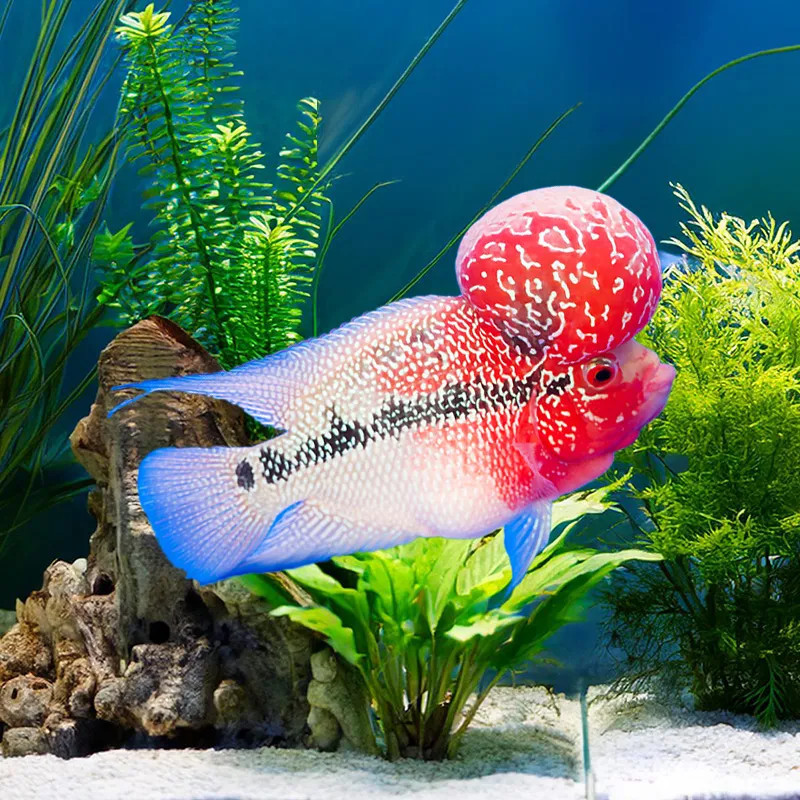Stocks Available
FW- Platinum OB Peacock Cichlid
SKU:125540
AULONOCARA SP.
2-2.5 INCH

Stock Available
Introduction: • Species: Flowerhorn • Common Names: Flowerhorn Cichlid • Natural Habitat: Originates from Southeast Asia, primarily bred in aquaculture; not found in the wild. They have been developed from various cichlid species, including Cichlasoma and Heros. Physical Characteristics: • Appearance: Recognized for their vibrant colors and distinct nuchal hump on the head. Their body is oval and robust, featuring a variety of colors including red, yellow, and blue with unique patterns. • Size: Can grow up to 12-16 inches (30-40 cm) in length, depending on the breeding line. • Lifespan: Typically live for 10-15 years with proper care. Habitat Requirements: • Tank Size: A minimum of 55 gallons is recommended for adult Flowerhorns, with larger tanks preferred for multiple fish or community setups. • Water Conditions: o Temperature: Optimal range is between 78-86°F (25-30°C). o pH: Should be maintained between 6.5 to 8.5. • Aquascaping: Provide plenty of open swimming space, along with hiding spots like caves and plants to reduce stress. Diet: • Primary Diet: Omnivorous; they thrive on a varied diet that includes high-quality pellets, live or frozen foods like shrimp, and vegetables. • Supplemental Feeding: Incorporate treats like bloodworms and brine shrimp to enhance their diet and color. • Feeding Frequency: Feed 1-2 times daily, adjusting portion sizes to prevent overfeeding. Compatibility: • Temperament: Known for their territorial and aggressive behavior, particularly during breeding. • Suitable Tank Mates: Compatible with larger, similarly assertive fish that can handle their temperament, such as certain cichlids and larger barbs. • Incompatibilities: Avoid housing with smaller or more peaceful species, as Flowerhorns may view them as prey. Care Level: • Difficulty: Moderate to advanced; requires experienced care due to their aggression and specific tank needs. • Health Monitoring: Regularly check for signs of illness, such as discoloration, stress, or unusual behavior. Breeding: • Breeding in Captivity: Breeding is possible in captivity; pairs will establish territory and lay eggs on flat surfaces. • Spawning: The male typically guards the eggs, while the female takes care of the fry until they are free-swimming. Economic Considerations: • Market Demand: Highly sought after for their unique appearance and vibrant colors, making them popular in the aquarium trade. • Wholesale Pricing: Prices vary based on color and quality, often ranging from moderate to high. • Retail Pricing: Retail prices reflect their popularity, often found in a range from affordable to premium. Sustainability and Conservation: • Wild Population: Flowerhorns do not exist in the wild due to their artificial breeding; however, the parent species may be affected by habitat destruction. • Aquaculture Efforts: Most Flowerhorns are bred in captivity, reducing the impact on wild cichlid populations. • Regulations: Ensure compliance with local laws regarding the breeding and sale of ornamental fish. Conclusion: The Flowerhorn Cichlid is a striking and popular fish among aquarists, known for its colorful appearance and unique characteristics. With their specific care requirements and potential for aggression, they are best suited for experienced hobbyists who can provide the appropriate environment. When properly cared for, Flowerhorns can thrive and add a dynamic presence to any aquarium.
Data sheet
16 other products in the same category:
Customers who bought this product also bought: